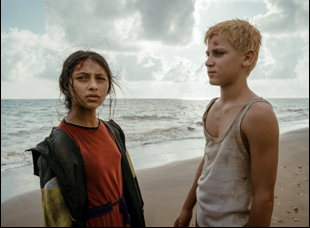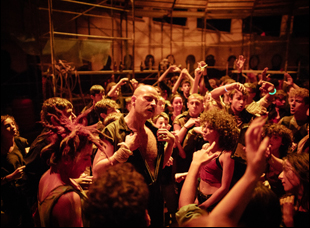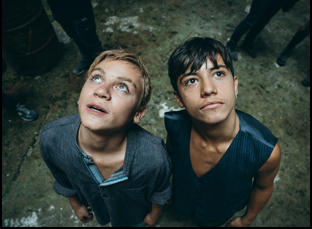“We don’t like fate because fate is the opposite of freedom,” Hothead (Alessandro Borghi), the leader of a gang known as the ants tells a young recruit named Mondocane (Dennis Protopapa), or “Dogworld” in its English translation,” in Alessandro Celli’s dystopian drama of that takes its title from the boy. It’s a compelling sales pitch to the young who can feel resigned to a future in which their fate feels predetermined, watching any adults that remain being robbed of their breath by crippling levels of pollution in the area pumped out for generations by the local steel mill. While some still endure, relying on the anchovies left to fish, eat and sell off the coast, Hothead has amassed both a considerable bounty and a veritable army in pillaging what’s been left behind by the dead and those who have slinked off elsewhere, though the local police continues to enforce the law, a fascinating grey area when not all of what the Ants take has been abandoned nor what all the police are protecting has any rightful owner in a community where it seems criminal to hold back any resources that could be used when so many are impoverished and they’d go to waste otherwise.
In such desperate times, there may not seem like much of a decision for Mondocane to make to join the Ants – in fact, his friend Piscisotto (Giuliano Soprano), unfortunately nicknamed “Pisspants” for being prone to having seizures, is deeply jealous of the invitation – but he knows enough on the cusp of puberty to wonder if he’s crossing a moral line he can’t come back from. With a choice that big, Celli places Mondocane in an environment of equal size and scope, imagining a wasteland in his native Italy where survival makes every move fraught with potential physical peril and even greater psychological strain no matter if one makes it out intact. Whether entering a fiery underground lair known as the Anthill or dodging bullets during a car chase, Mondocane doesn’t only have to fight to live, but reckon with the consequences should he live another day and while everyone in Celli’s debut feature after a career working in episodic series is looking for an escape, the director creates a world worth getting lost in as a viewer, opening up the senses as his young antiheroes do as they start to make sense of their surroundings.
After premiering last fall at the Venice Film Festival, “Mondocane” is beginning to make its way around the world including a theatrical run in the States and on the eve of its release, Celli spoke of the real-life inspiration behind the film, working with his young cast and resetting global expectations when it comes to Italian cinema.

Yeah, I actually started working on coming-of-age short films and I was wondering if we could try something very new for the Italian industry, which is to try and build a world in a feature film and not a TV series and also still keep that flavor of it being a very intimate story. Production-wise, it was not easy as a debut film, so it took some time and I was working for a production company, writing, reading and reviewing scripts and it took me some time, but in the end, I found the right producer, a young guy Matteo Rovere, who is doing something really brave with his company, doing action genre [films].
At one point in the film, Hothead cites the real-life Taranto Steel Plant, which I understand was the inspiration for this when the levels of dioxin emissions were tied to a surge in cancer in the region. How did that open up the story?
That’s something I really care about because in Italy, we have the biggest steel plant in Europe in Taranto, down south as a kind of a forgotten place. It’s a beautiful place, but the stories of its pollution have been way more famous and now there’s a big debate about what are you going to do because it gives so many jobs to people and it’s so important for the [economic] health of the city itself, but it’s extremely unhealthy [for the residents]. So the idea was “Okay, let’s make a sci-fi film, but let’s make it so people will read into this some slight criticism for our very Italian way of solving problems, which is slow and a bit clumsy, with a lot of contradictions.” It sounded to me like a regression to a more basic world and there’s a lot of references to Africa where Africa is [portrayed as] a better off place in the future.

Poverty pretty much looks like itself all around the world. I was looking at favelas, thinking we didn’t have any in Italy, but it’s not true. They’re all over the place – I remember the “District 9” film from South Africa was a really interesting sci-fi film, I think with very similar premise. specifically, the one I built in Taranto and Rome – we shot in two different places – is actually based on some pictures taken in Buenos Aires, but it’s just a place where people get together create a little town from nothing.
The toughest part was shooting in Taranto because Taranto is completely controlled by the actual steel mill, but I wanted the local people to recognize those landscapes, so a lot of abstract places were chosen all over, near Taranto where we were free to shoot – the harbor area in Taranto was completely off-limits for me, but we found another industrial harbor that allowed us to shoot and then there were places in Rome, like abandoned steel mills or construction lofts. Anything we could convert into an abandoned world.
What was it like to find your two leads Dennis and Giuliano?
I really wanted them to be local and of the exact age of the story, which was 13 or 14, so we went around Taranto and the outskirts and the beach and we found them there. It was tough. There was a major lockdown in that moment, but as soon as we were able to move from regions, I went there physically and the dynamic of this friendship and how things were going to unfold, but there has been a lot of improvisation. I asked the boys to come up with their slang and come up with anything that could be extremely natural for them to do [while sticking to the script] and they are true friends in life. That was very important thing because Taranto is not such a big place. They’re the same age and they hang around the same areas, so they knew each other [before filming]. They were friends and they became very, very close after the film.

Was there a particularly crazy day of shooting? You’ve got some pretty wild car chases and burning buildings.
A lot of crazy things. The film is ambitious, but it’s still a debut film. It is not that big. There were certain key scenes which clearly the producer and I decided to throw in all our resources. The Anthill was a really huge location that needed a lot of work, both in the interior part and also the circular center [of that set] – basically, it’s a huge hole in the ground, and we needed to put in security to be shooting in it, so it was a lot of work. We didn’t have that much time of course because it was a big production effort. Then the toughest day was when I shot the firemen coming to pick up the orphans and take them away. That was a very complicated moment of choreography and a lot of makeup, but the shootouts were the least [difficult]. [laughs] It’s more like a lot of kids getting a lot of makeup.

The selection at the International Film Critics Week in Venice was big news, but that’s the first place we hoped for because it’s a competition specifically for debut films and it was a really good combination to be there with a genre film that was science fiction but at the same time it’s a very arthouse competition. Since then, the reviews are very good and people have been very surprised. The main thing I’ve heard is, “We could not imagine that these films could be made in Italy because we’re not accustomed to having these kind of action scenes with bigger budgets. We let North America do that.” So I’m very happy and I’m extremely excited to present it in North America. I grew up in Italy, but I have a Canadian father, so I have relatives eagerly awaiting this film and they will be seeing it finally.
“Mondocane” opens on May 20th in New York at the Angelika Film Center and Los Angeles at the Landmark Westwood, the Laemmle Glendale and the Pasadena Playhouse 7 before expanding nationwide.




